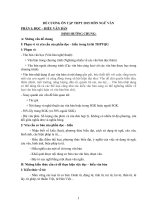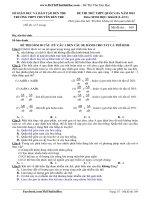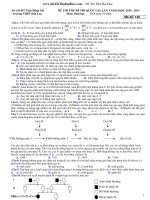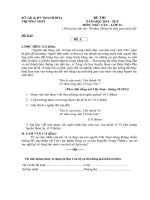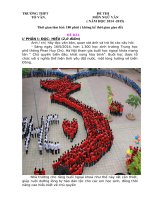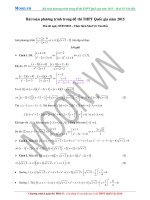- Trang chủ >>
- Mầm non - Tiểu học >>
- Lớp 2
DE THPT QG
Bạn đang xem bản rút gọn của tài liệu. Xem và tải ngay bản đầy đủ của tài liệu tại đây (67.14 KB, 6 trang )
<span class='text_page_counter'>(1)</span>MR. BEAN’S MATERIALS (Đề thi gồm: 05 trang). ĐỀ KTCL ÔN THI THPT QUỐC GIA NĂM 2016 Môn: TIẾNG ANH – ĐỀ SỐ 38 Thời gian làm bài: 90 phút, không kể thời gian phát đề. PHẦN TRẮC NGHIỆM: (8 điểm) Mark the letter A, B, C, or D on your answer sheet to indicate the word whose underlined part differs from the other three in pronunciation in each of the following questions. Question 1: A. wicked B. cooked C. sacred D. started Question 2: A. head B. spread C. breath D. crease Mark the letter A, B, C or D on your answer sheet to indicate the word that differs from the other three in the position of the primary stress in each of the following questions. Question 3: A. underline B. recognize C. sacrifice D. localize Question 4: A. gasoline B. potato C. computer D. advantage Question 5: A. environment B. difficulty C. community D. inhabitant Mark the letter A, B, C or D on your answer sheet to indicate the word(s) CLOSEST in meaning to the underlined word(s) in each of the following questions. Question 6: There is no alternative. The president must approve the bill if the Congress passes it A. possible agreement B. amendment C. other choice D. tome to think Question 7: The guards were ordered to get to the king's room on the double. A. in a larger number B. very quickly C. on the second floor D. every two hours Question 8: The kidnapper gave himself up to the authorities. A. surrendered B. confided himself C. went up D. accommodated himself Mark the letter A, B, C, or D to indicate the word or phrase that is OPPOSITE in meaning to the italic part in each of the following questions. Question 9: This shouldn’t be too taxing for you. A. comfortable B. demanding C. easy D. relaxing Question 10: The Germany’s war hysteria has accounted for its people’s hostility towards foreigners. A. disease B. ceremony C. malaria D. serenity . Mark the letter A, B, C, or D on your answer sheet to show the underlined part that needs correction in each of the following questions. Question 11: Wind is the motion that occurs when lightest air rises and cooler heavier air replaces it. A. it B. that occurs C. lightest D. cooler Question 12: These exercises look easy, but they are very relatively difficult for us. A. These exercises B. for C. easy D. very relatively Question 13: A dolphin can communicate with other by making distinctive sounds. A. making B. sounds C. communicate D. other Question 14: Salmon lay their eggs and die in fresh water, although they live in salt water when most of their adult lives. A. although B. when C. live in D. lay Question 15: Rock music was original a mixture of country music and rhythm and blues. A. Rock music B. original C. music D. and Mark the letter A, B, C, or D on your answer sheet to indicate the correct answer to each of the following questions. Question 16: - Jack: "What's wrong with you?" - Jill: "_________________." A. I'm having a slight headache B. Thank you very much C. Yes, I was tired yesterday D. No, I don't care Question 17: How long ago_____________ to learn French?.
<span class='text_page_counter'>(2)</span> A. would you start B. did you start C. were you starting D. have you started Question 18: You think that she will come to the party tomorrow, _____________? A. do you B. will she C. don’t you D. won’t she Question 19: I'd rather you ____to the English-speaking club with me this Sunday. A. came B. will come C. come D. to come Question 20: Switch off all the lights____________. A. after you will leave the room B. until you enter the room C. before you leave the room D. by the time you enter the room Question 21: No sooner_____________ my car than the alarm went off. A. the thief had touched B. the thief touched C. had the thief touched D. touched the thief Question 22: Neither Tom nor his brothers___________ willing to help their mother with the housework. A. was B. are C. has been D. is Question 23: ______________ that she does not want to stay any longer. A. So homesick does Beth feel B. Beth feels such homesick C. Homesick though Beth may feel D. A little homesick does Beth feel Question 24: I hope you will_____________ notice of what I am going to tell you. A. gain B. keep C. get D. take Question 25: Nowadays, most students use_____________ calculators in their studies and examinations. A. electrical B. electronic C. electricity D. electric Question 26: Spain has won the championship, _____________ is not surprising. A. what B. which C. how D. that Question 27: - Susan: "Oh my God, I've missed my bus." - Christ: " _________________. Another will come here in ten minutes." A. Don't worry B. Thank you C. Don't mention it D. I hope so Question 28: It_____________ it is parents' responsibility to take good care of their children. A. commonly says that B. is commonly saying C. commonly to be said that D. is commonly said that Question 29: College students are becoming less dependent_____________ their teachers. A. on B. with C. of D. to Question 30: She is the woman about_____________ I told you. A. which B. whose C. whom D. that Question 31: My teacher reminded me_____________ my essay carefully before handing it in. A. checked B. checking C. to have checked D. to check Question 32: You should study hard to_____________ your classmates. A. catch sight of B. make use of C. get in touch with D. keep pace with Question 33: - Mary: "Do you mind if I sit here?" - Laura: "_________________" A. Don't mention it. B. My pleasure. C. No, not at all. D. Yes, why not? Question 34: _____________ he was tired, he still watched the final match on TV. A. Though B. However C. Despite D. Because Read the following passage and mark the letter A, B, C, or D on your answer sheet to indicate the best answer to each of the following questions. Speed reading is not just a parlour trick you can use to impress your friends and family. For many, it's a necessary tool for managing time and information in the fast-paced business world; and for many others, specifically students, it's the only way to get through reading-heavy class loads. The practiced speed reader can pick up a lengthy document or a thick stack of paper and use their skill to get the meat of their subject by skimming for the most important details and information. Without developing the ability to speed read, this time-saving technique is merely flipping through pages fast. Speed reading, or increasing the rate at which you read text, is linked to increasing the rate at which you understand what you’re reading. The key to successful speed reading is increasing your.
<span class='text_page_counter'>(3)</span> understanding of the text as you increase the rate at which you read the words. This natural step takes training and practice, but don’t be intimidated by the idea of a challenge. Once you've mastered it, it's a skill that will stick with you for the rest of your life. With continued practice, common words and sentence structures became more familiar and because your brain was tuned and ready, your eyes started taking in Wocks of wml* at a time. The difference between average readers and speed readers is in the blocks of words their eyes take in at one time. The larger the blocks, the faster your eyes move through the text. Speed reading teaches you how to take your reading and your comprehension to the next level. The techniques used in teaching speed reading focus on your individual abilities, namely where you are right now and what might be keeping you from progressing. For example, if you are a slow reader, factors that hold you back may include, but are not limited to, moving your lips or reading out loud or holding the text too close to your eyes. If you are in the practice of moving your lips, or speaking or whispering while you read, you're slowing yourself down dramatically. Your lips can only move so fast. You should be able to read at least two or three times faster than you can speak. In effect, you’re keeping yourself at that word-by-word stage that children generally grow out of in elementary school. Having the ability to speed read can make a significant difference in your life, especially if reading is a strong component of your work. Implementing some simple techniques can get you reading faster and more efficiently in no lime at all. (From Understanding Speed Reading by Brandon C. Hall) Question 36: What does the passage mainly discuss? A The practice of speed reading B. Features of speed reading C. The use of speed reading in studies D. Various roles of speed reading Question 37: According to the passage, why is speed reading useful for students? A. They have problems collecting information. B. They can impress their friends. C. They have difficulty managing their time. D. They have a lot of reading to do. Question 38: The word "meat" in the passage is closest in meaning to___________. A. core B. nourishment C. understanding D. nutriment Question 39: According to the passage, what happens if the reader does not develop their capacity to speed read? A. Readers cannot get the gist of what they have read. B. Readers cannot increase the rate of understanding what they are reading. C. Speed reading means flipping pages as fast as possible. D. Speed reading may prevent them from understanding what you have read. Question 40: The word "intimidated" in the passage is closest in meaning to___________. A. shy B. angry C. frightened D. tired Question 41: According to the passage, what is the difference between an average reader and a speed reader? A. The average reader recognizes more familiar words. B. The average reader understands fewer words at a time. C. The average reader takes in bigger blocks at one time. D. The average reader moves faster through the text. Question 42: According to the passage, what is true about the strategies used in teaching speed reader? A. They focus on slow readers. B. They encourage readers to move lips. C. They centre on readers' personal capabilities. D. They consider the readers’ schooling ages. Question 43: The word "dramatically" in the passage is closest in meaning to___________. A. quickly B. ordinarily C. considerately D. considerably Question 44: According to the passage, all of the following statements are true EXCEPT___________..
<span class='text_page_counter'>(4)</span> A. You should be able to read at least twice as fast as you talk. B. Speed reading decreases your understanding of the text because you are skimming. C. Speed reading plays an important role in student learning. D. Increasing your understanding of the text should go with increasing your reading rate. Read the following passage and mark the letter A, B, C, or D on your answer sheet to indicate the word(s) that best fits each of the numbered blanks. A trend that has emerged recently is the sharing of childcare (45)__________ between husband and wife. Young couples will try to arrange their work schedules so that they work (46)__________ hours or shifts in order that one parent is always home with the children. Since childcare is expensive, this saves money for the young couple trying to establish (47)__________ and provide a secure environment for the family. Husband and wife may also share household (48)__________. Some fathers are just as capable as mothers at cooking dinner, changing and bathing the baby, and doing the laundry. In some cases, the woman’s salary is for family (49)__________ and the father becomes the “househusband." These cases are still fairly rare. One positive trend, however, is that fathers seem to be spending more time with their children. In a recent survey, 41% of the children sampled said they spend equal time with their mothers and fathers. “This is one of our most (50)__________ cultural changes,” says Dr. Leon Hoffman, who co-directs the Parent Child Center at the New York Psychoanalytic Society. In practice, for over 30 years, Hoffman has found "a very dramatic difference in the involvement of the father in everything from care-taking to general decision (51)__________ around kids' lives.” Another factor has recently been added to the childcare (52)____________. The number of people who work from home nearly full-time rose 23% from the last decade. The (53)__________ of technology computers, faxes, teleconferencing - has made it easier for at-home workers to be constantly in touch. Will this new flexibility in the workforce bring a positive change for the (54)__________ of children? Only time will tell. (From Mosaic Reading I by Brenda Wegmann and Miki Knezevic) Question 45: A. abilities Question 46: A. opposite Question 47: A. himself Question 48: A. dreams Question 49: A. payment Question 50: A. significant Question 51: A. giving Question 52: A. sectors Question 53: A. accessible Question 54: A. well-being. B. possibilities B. during B. themselves B. duties B. fares B. significance B. creating B. tasks B. accessibly B. human being. C. responsibilities C. for C. herself C. facilities C. expenses C. significantly C. holding C. formula C. access C. love. D. techniques D. similar D. itself D. opportunities D. fees D. sign D. making D. cost D. accessibility D. gender. Read the following passage and mark the letter A, B, C, or D on your answer sheet to indicate the correct answer to each of the questions. One of the factors contributing to the intense nature of twenty-first-century stress is our continual exposure to media - particularly to an overabundance of news. If you feel stressed out by the news, you are far from alone. Yet somehow many of us seem unable to prevent ourselves from tuning in to an extreme degree. The further back we go in human history, the longer news took to travel from place to place, and the less news we had of distant people and lands altogether. The printing press obviously changed all that, as did every subsequent development in transportation and telecommunication. When television came along, it proliferated like a population of rabbits. In 1950, there were 100,000 television sets in North American homes; one year later there were more than a million. Today, it's not unusual for a home to have three or more television sets, each with cable access to perhaps over a hundred channels. News is the subject of many of those channels, and on several of them it runs 24 hours a day..
<span class='text_page_counter'>(5)</span> What's more, after the traumatic events of September 11, 2001, live newscasts were paired with perennial text crawls across the bottom of the screen - so that viewers could stay abreast of every story all the time. Needless to say, the news that is reported to us is not good news, but rather disturbing images and sound by alluding to disaster (natural and man-made), upheaval, crime, scandal, war, and the like. Compounding the problem is that when actual breaking news is scarce, most broadcasts fill in with scare stories about things that possibly might threaten our health, safety, finances, relationships, waistline, hairline, or very existence in the future. This variety of story tends to treat with equal alarm a potentially lethal flu outbreak and the bogus claims of a wrinkle cream that overpromises smooth skin. Are humans meant to be able to process so much trauma - not to mention so much overblown anticipation of potential trauma - at once? The human brain, remember, is programmed to slip into alarm mode when danger looms. Danger looms for someone, somewhere at every moment. Exposing ourselves to such input without respite and without perspective cannot be anything other than a source of chronic stress. Question 55: According to the passage, which of the following has contributed to the intense nature of twenty-first-century stress? A. Our continual exposure to the media B. The degree to which stress affects our life C. An overabundance of special news D. Our inability to control ourselves Question 56: In the past, we had less news of distant people and lands because______________. A. the printing press changed the situation too slowly B. printing, transportation, and telecommunications were not developed C. most people lived in distant towns and villages D. means of communication and transportation were not yet invented Question 57: The pronoun "them" in paragraph 3 refers to______________. A. cable access B. TV channels C. television sets D. TV news Question 58: The word "traumatic" in paragraph 4 is closest in meaning to____________. A. fascinating B. exciting C. upsetting D. boring Question 59: According to the passage, when there is not enough actual breaking news, broadcasts ______________. A. are full of dangerous diseases such as flu B. send out live newscasts paired with text across the screen C. are forced to publicize an alarming increase in crime D. send out frightening stories about potential dangers Question 60: As stated in the passage, a flu outbreak and the bogus claims of a wrinkle cream tend to ______________. A. involve natural and man-made disasters B. be scarce breaking news C. be warmly welcomed by the public D. be treated with equal Question 61: Which of the following is NOT true, according to the passage? A. Many TV channels supply the public with breaking news. B. The only source of stress in our modem life is the media C. Many people are under stress caused by the media D. The news that is reported to us is not good news. Question 62: The word "slip" in paragraph 6 is closest in meaning to______________. A. release B. fail C. bring D. fall Question 63: According to the passage, our continual exposure to bad news without perspective is obviously______________. A. the result of an overabundance of good news B. a source of defects in human brain C. the result of human brain's switch D. a source of chronic stress Question 64: What is probably the best title for this passage? A. The Media - A Major Cause of Stress B. More Modem Life - More Stress.
<span class='text_page_counter'>(6)</span> C. Developments in Telecommunications. D. Effective Ways to Beat Stress. II. PHẦN TỰ LUẬN (2 điểm) Part I: Finish each of the following sentences in such a way that it means the same as the sentence printed before it. Question 1: She said, “I moved to this city five weeks ago”. → She said that she had moved to this city five weeks before. Question 2: We began learning English five years ago. → We have been learning English for five years. Question 3: Although he is old, he is very strong. → However old he is, he is very strong. Question 4: I am very busy. I can’t go to the cinema with you tonight. → If I were not busy, I could go to the cinema with you tonight. Question 5: Mother entered the room quietly. She didn’t want to wake up her baby. → In order not to wake up her baby, mother entered the room quietly. Part II: Paragraph writing: In about 140 words, write a paragraph to give your opinion about the negative effects of social networks on teenage students. The suggestions below may help you: - Waste of time and money. - Affect health negatively. - Causes of bad behavior, violence, or crime. SAMPLE WRITING Undoubtedly, social networks change the ways many of us communicate, respond to life and live both positively and negatively. For the good things we all easily see, the bad effects are still recorded. To begin with countless time and money are lost by the networks addicts every single day. Smart phones, tablets, computers are on all the time with the pages of face-book, google plus, twitter,… awaiting. Likes, comments, shares are frequently made, of which blue languages also heard of. To continue with the damage to health by over-surfing, records have shown cases in which teenage students neglect their study, and other daily routines, spend time browsing their favorite sites till exhaust. Moreover, owing to uncontrolled activities done while networking, bad languages, teenagers may end up in trouble with violence, or even criminals. In conclusion, despite positively communicative aspects, social networks also do harms to students. (146 words) ------------ THE END ------------.
<span class='text_page_counter'>(7)</span>
